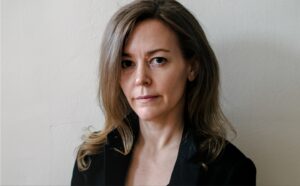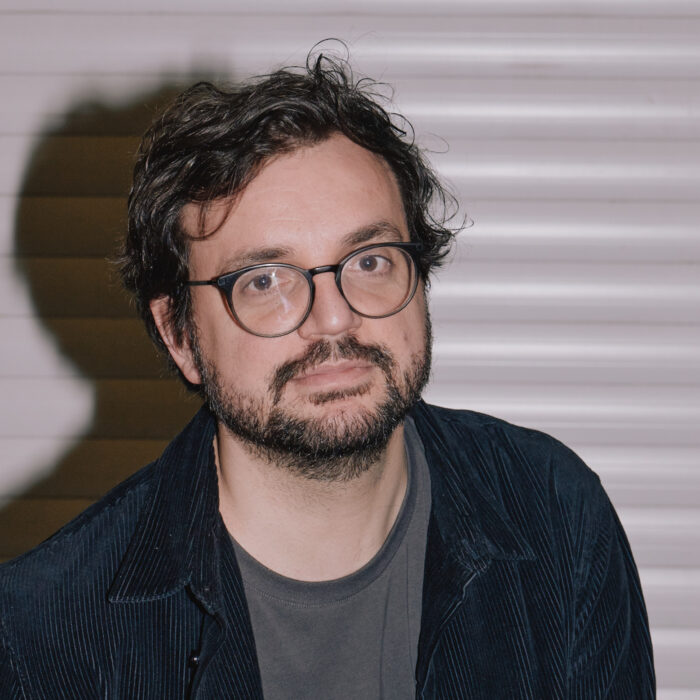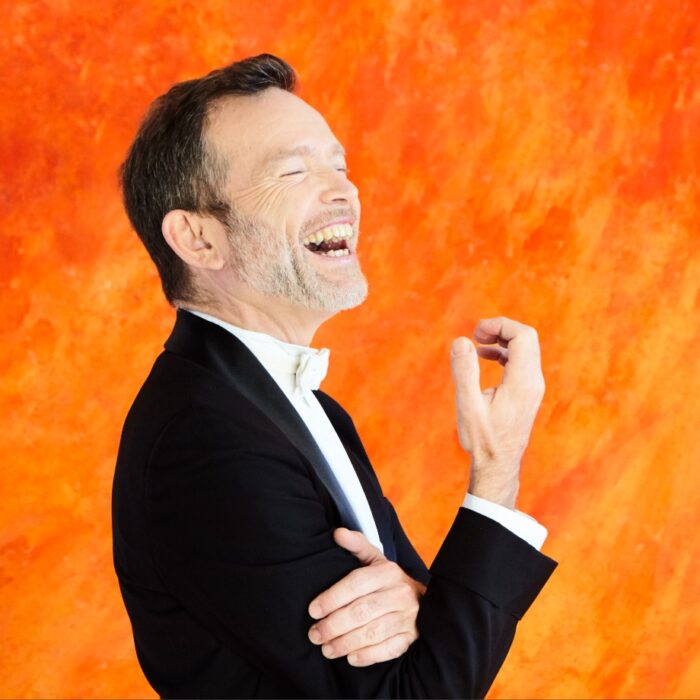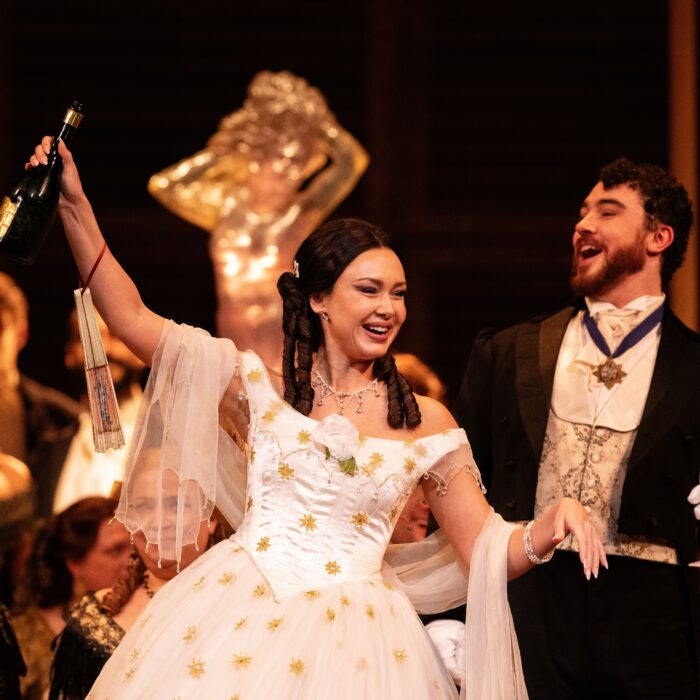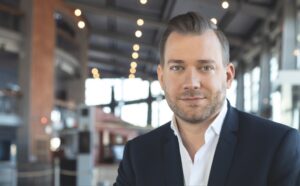
Q & A: Göteborg Opera Artistic Director Henning Ruhe On What It Takes to Bring Opera Forward
By Jennifer Pyron(Photo credit: Tilo Stengel)
Göteborg Opera won the award for Sustainability at the International Opera Awards 2022 Gala at Teatro Real in Madrid. Artistic Director for Opera/Drama, Henning Ruhe, makes his role a leading example by honoring ecological sustainability and collaborates with other opera house to make a positive difference along the way. This company celebrates its 30th year anniversary with an exciting season this year, including two new productions of Verdi’s “Otello” directed by Rafael Villalobos and Britten’s “Peter Grimes” directed by Netia Jones (her first time).
OperaWire had the pleasure of attending the season opener of Bizet’s “Carmen”, and their program also includes revivals of the “Brescia version” of “Madama Butterfly,” and a double bill of Mozart’s “Der Schauspieldirektor” and Tchaikovsky’s “Iolanta.” There will also be a production of Puccini’s “Tosca,” which is not to miss!
Just before kicking off the night’s opening production of “Carmen”, Artistic Director Henning Ruhe visited with OperaWire in person to discuss what it is that makes opera sustainable today and how Göteborg Opera inspires the future.
OperaWire: What can you tell our readers about Göteborg Opera and what are you most excited about for this season?
Henning Ruhe: Göteborg Opera theater is the second largest cultural institution in the country, behind the Royal Opera in Stockholm. However, the number of seats is at the same level with 2,000 seats in the theater plus 150 seats available in the dance pit. We strive to be one of the most interesting houses of the north, together with Stockholm, Oslo, Copenhagen and Helsinki. We see ourselves as an international house, and as much as we are here for the city we still want to do opera, musicals and dance at the highest level. We have a world-famous contemporary dance company, the Göteborg Opera dance company. They perform here and also go on tour all over the world.
Opera has been a success story for this opera house for 30 years now. We are currently celebrating our 30 year anniversary. The company itself, in a different theater, has been around for 150 years. And one still very much feels it, and that’s what I like about this place, when the opera was formed it was not like how in some other places a king has said they want to have an opera house. Göteborg Opera comes from the people in town that built this and when this was built they raised a lot of funds from local merchants and companies that supported this opera house. One can still really feel this energy, this is all something we wanted to do together.
We perform six to seven opera titles per year and one big musical, which is for us fun and at a high production level. We have opportunities to do really nice productions in opera and dance. It’s a nice balance so we can have a really broad offer to our visitors. We have between 400-500 people working here and a lot work here full time. So we have an ensemble system for the singers: an orchestra of 85 players, a choir of 46 singers, a dance company of 36 dancers, and a lot of colleagues in the technical department. We produce a lot ourselves, and we also cooperate with other opera houses.
During the season I try to have a good balance between styles and what the audience may or may not know yet. And I am very excited about this season. It begins with a familiar classic, “Carmen,” a David McVicar production from Glyndebourne. This is a wonderful way to start the season, it’s a great piece with a lot of energy and a known classic. We see this really with the audience. It can sometimes be hard in August to bring in the audience because there is so much going on, but this weather today, for example, makes people want to be outside. In a month the weather will be very different from now, but this year is going really well.
We have three new productions for this season that I’m really looking forward to, including “Otello” for the first time with director Rafael R. Villalobos and set designer Emanuele Sinisi. We are also doing “Peter Grimes” in March 2025, which for me was at the top of the list of pieces that I wanted to do simply because if you walk down one kilometer in this direction (points out into Göteborg) it could happen there. We also have British award winning director and video designer Netia Jones doing this production. We are also doing a double opera bill of Mozart’s comedy “Der Schauspieldirektor” and Tchaikovsky’s fairy tale opera “Iolanta”. The production will build upon a lot of video projections and plays with these images of light that have a good connection to the piece. The big musical this year is “Charlie and the Chocolate Factory.” It’s a bit nostalgic and will be entertaining for both kids and adults. Both the book and the piece have so many weird things going on that we are bringing forward so it’s not just a kid’s show. We also have a very well-known actor in the role of Willy Wonka, Ola Salo. This happens in September and we will all be covered in chocolate!
We also send projects on tour in our region and it’s pretty big. There are a lot of small towns and villages where we go and bring culture to them. We do projects with schools through our outreach department and do concerts in the foyer. We really want to be a center of culture where there is something going on all the time. There isn’t one thing I’m most excited about because I am excited about everything and there’s always something happening next!
OW: Tell us about sustainability efforts here at the theater and what it means to be a Green Opera House.
HR: The Göteborg Opera won the award for Sustainability at the International Opera Awards 2022 Gala at Teatro Real in Madrid. All of the initiatives really culminated with our production of The Ring that we did where sustainability was very much the topic of the concept for it by my predecessor Stephen Langridge and around that the company did a lot of initiatives with sustainability in 2018. For example, for the stage set we needed materials that people would normally throw away, so we asked for people to donate their old cell phones, that we could use later on. We also planted a lot of trees and the stage set was made from sustainable materials, and we used them for all the different parts. No harmful chemicals were used for the production. For example, the fire was made with steam instead of fake smoke.
All together, sustainability is very important to us in the production process in terms of what materials we use. We tend to always try to reuse as much as we can. We have a huge costume backstock so that we don’t need to buy new fabric all the time. We also exchange with other theaters. This also goes for the technical department, where we don’t use certain plastic materials. We always try to take other initiatives. We have solar panels on our roof and the bees on the roof, of course. Most houses usually have this nowadays. Another thing is there is so much traveling going on in the opera business that it’s a rule here to offset the carbon footprint from the travel for everybody who comes.
OW: How do you offset the carbon footprint?
HR: It’s hard to avoid flying here, but through a financial contribution we are able to give back.
OW: I was trying to imagine this because would it be possible to have people take a boat here to the opera?
HR: We are examining this now, actually, because our dance company is touring so much. We are choosing how to travel based on where we are going. For the cities that are closer, there are more opportunities for travel options. So, this is a big topic right now. We are looking for how we can do this for the future. And I think the theater business has a lot more potential to do this, but we also want to get the audience on board and make this a relevant topic. This starts by making sure our audience doesn’t come here by car, for example, but mostly by public transportation. We want to keep this topic going all the time, and especially in the technical departments as well. It’s the traveling and the materials, as well, that contributes most to the carbon footprint we have. We try to limit this as much as we can while still offering high level productions. When it comes to the lighting equipment, nowadays, we have exchanged all the heavy electricity producing technologies to newer technologies that don’t need as much energy to run a show. Things like this.
OW: Do you partner with other organizations or opera houses that are also doing this to grow and develop these ideas together to better this initiative? How do you learn to do what you need to do, and then do better for next year?
HR: We are very connected with all the European houses mainly through the Opera Europa network where sustainability is one of the key topics that we have. There is a separate sustainability forum as well. A lot of theaters nowadays have a sustainability responsibility department. There’s a lot of knowledge exchange and through the network itself there are people who, when they have an initiative, need partners and will reach out. There’s also exchange among productions going on which is one factor in sustainability. Does every opera house need to produce their own “La Traviata” or can they share? A lot of times when there are interesting initiatives they have the opportunity to present it and this way we definitely learn about new ideas people are working on, and this is very helpful.
OW: As Artistic Director, what have you learned the most since you started at Göteborg Opera in 2020?
HR: It has been very particular because for the first one and a half years I didn’t get to meet my audience, due to Covid, and this is usually what one needs to do in the beginning to learn about what does and doesn’t work. What do I need to develop? What do I not need to develop? So, this was a bit of a challenge in the beginning for me, but now we are past that. There is always the one challenge about what exactly we put on for the season and what functions in this space. I very much think that an opera house is rooted in the society it exists in. And this is completely different based on wherever you are. What we did in Munich, for example, when I was Artistic Director there, would not necessarily work here because people have other experiences. In Munich we put on 40 different operas per year and we could be super avant-garde in one thing because the audience that is looking for more traditional productions can go to a different show tomorrow. At Göteborg Opera we only play six or seven titles per year and a lot of first-time productions are happening now, as I mentioned before with “Otello” and last year with “Nabucco”. This is based on the different experience level of the audience that I need to take into account. There is a very vibrant theater scene in town so it’s not that people aren’t used to going to the theater, but one can’t see “The Magic Flute” here every year as one could do in Munich or New York.
Another learning step that I appreciate very much is working in this particular work culture here, which is very different from Germany’s culture, where I worked before. The culture here is based on inclusion, is very democratic, and most of the time we work in groups or teams. There is never a simple top-down decision being made, it’s always rooted in all of our colleagues here. This is something that’s taken a bit of time for me to get into because it’s a very different way of thinking about who do I need to include in this and how do I strategically get a result in the best and fastest way? And I must say the wonderful thing is once you get to a decision, which often takes a bit longer than other systems, then everybody is on board. And this is a beautiful thing, so a lot of colleagues who just come here say it’s so obvious that everybody somehow knows what’s going on and they’re excited about it. This creates a much more open atmosphere in the house compared to a lot of other houses and this is a wonderful thing. I’m very happy about this and acquiring this way of working.
OW: This makes me think about the power of collaboration and how it is the way forward because the old “top-down” systems aren’t working as efficiently. They feel old and unnecessary in a lot of ways, actually. How do you feel that collaborating here with the local community, for example, being present in the schools and introducing opera and the arts at an early age in collaboration with children positively influences the future as a whole?
HR: For me, this isn’t even a question. It is absolutely necessary to do this and we all know that schools themselves don’t talk as much about culture as they should and used to. Music classes are being reduced because they’re not deemed important enough. But we see that a lot of what’s being taught at school is more dominated by economical aspects, or training the kids to become “good employees” in the future. But this misses the broader aspects of becoming a human, actually, and not just someone who is ready for a profession. So this isn’t even a question, we need as many cultural institutions to reach out. It is also important for us to say that we are here for everybody. We are very welcoming and we want to be accessible for everybody. This doesn’t mean that we just offer affordable tickets, we also need to support people who are not that experienced with opera, or who don’t know that there is an opera house, or who don’t think this is for them. A lot of people here in town know that we are here, but may think that this is only for the rich. There are so many prejudices out there, and it is very important to go out there and share what we are doing. There are many cultural codes used in opera, beginning with the languages, and then there is the music which is so unusual. Teenagers nowadays don’t grow up with opera music. The musical we do here also helps a lot with this initiative because that is, for a lot of people, the first step to come to this theater. But, this doesn’t mean the next time they will come for “La Traviata”. So there are still more things that may need to be overcome. We have a good collaboration with schools that have increased a lot and I know that in the beginning some people said that schools were not interested and teachers were not interested. But in a week we had like 25 schools that wanted to participate. So there is the will, but what is a bit difficult is that you need to fit into the school schedules. For example, inviting kids to come in the evenings is a bit tricky unless there is a teacher that is really motivated. We also open up dress rehearsals and I let directors know when they come here that there will be school classes at some point. We want to open the doors to everyone and this changes two things: number one is we need to have an audience in 20 years, and from someone who has made contact with the theater in their early years, even if they have a period where it’s not a priority, they are much more probable to come back when they are older. But for this, you need to have that contact in the beginning. It’s also changing right now, as you can see, the average audience age here is rather low. We see a lot of young people and a lot of families who come here. This for us is a very different dynamic together with a variety in the audience. But also, reaching out to the society there are so many professions that we develop here at the theater and we do that quite regularly where we not only introduce the art but we also introduce and learn about the professions that are part of the theater. So maybe you don’t reach someone via the music, but they love the costume design or that makeup or the technical work. For this we have a very good partnership with the chamber of commerce where we are part of their training initiatives. This helps us to reach out to the young people and at the same time it helps us to reach out to local businesses and bring them onboard as well. I find all of this very exciting and this is very interesting, especially in the Swedish context, where it’s never top-down. So, we also have what we call the “young ambassadors”, a group of teenagers (ages 16 to 24 years old). They are ambassadors that go out to their friends, but also go out to the young generations for us. We have regular meetings with them, we workshop pieces with them. We make this connection as well, and I think this is important for this generation to not feel as though they are passive in this process, but that they are an active part and they are being listened to.
OW: You mentioned earlier about the immediate residential development taking place here in this area surrounding Göteborg Opera theater and when you told me about this I had a vision of roots extending out from here. In this context of hopeful imagination, what would you say your legacy is as Artistic Director here? What do you want for Göteborg Opera over the next five, ten, plus years?
HR: My goal really is to bring enthusiasm about opera a bit forward and back to this town. I want to expand upon this a bit. Especially here in Sweden, as in many countries, we have a prejudice towards opera as being an elite artform. In Sweden, because of the cultural history that is very group oriented and made accessible to everyone, there is also this tendency to not want to stick out too much. One should stay a bit within the group. So, to label something as elite is a problematic thing and for me this is something I feel we have overcome here. As you will experience, our house is as accessible as opera can be, or any institution can be. But still this label is used in many discussions against us and I don’t want to take this in the way of something special. I think we still need to keep up that we are an exciting place you want to be part of, on the other hand, you don’t get opera without everybody really giving their best in it. This is where I think so much gets mixed up behind this misperception of elitism. Of course one needs to be able to pay for a ticket, of course one needs to be able to sit down for three hours and concentrate and follow something that might be in a different language. On the other hand, everybody here can sit in a movie theater where all films are shown in their original language with subtitles. Nobody says film is elite and only those who understand those languages can enjoy it. We are in a country where a dish of pasta costs twenty dollars and a glass of wine costs 15 dollars, and the restaurants are full. So saying opera tickets are too expensive just shows that this is a prejudice. But, one only gets so far by explaining and teaching about what we are doing. Of course we need to do this, but what’s most important is enjoying it and doing it with the greatest enthusiasm and not being ashamed that we are doing an artform that some may think is elite. I want to bring everybody along because if we are enthusiastic about what we are doing then we can bring in people and give them that enthusiasm. This joy, this energy about the old classics but also about new repertoire is something I want to bring forward and stand for. Sometimes we get too caught up in “opera should be that, no opera should be that” where I think we need to embrace all these different aspects that opera can be. There’s not just one definition of opera and this is great. We shouldn’t get caught up in these labels, because what matters in the end is how we put shows together where people for three hours sit in their seats and get drawn in because they’re enjoying it. The connection that only music theater can do is one where you are so overwhelmed with the music and stage full of singers right in front of you. This, for me, makes my job the best possible job in the world. I enjoy every day that I am here and get to work on this. If I have a tough day, I go see the performance at night and I can say that yes, this is why we are doing this. This is all totally worth it because of the wonderful moments we create and this is what I want to have as my legacy.
